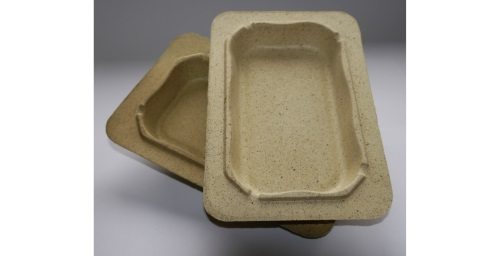German-based eco-businesses Zelfo Technology and Upgrading have carried out trial production of up-cycled wheat straw-based Micro and Nano Fibrillated Cellulose (M/NFC) packaging solution.
The material uses only the food producers’ lingo-cellulosic fiber (in this case wheat straw) and requires no additional binder.
Designed to meet food industry packaging demands, the resulting products have a robust and flexible form and smooth ‘closed’ product contact surface.
The trial moldings are approximately 250 x 150 x 50mm, sizes beyond or smaller than this are to be offered as standard.
Non-toxic dyes can also be used to color the product as required by the seller.
The trials used wheat on this occasion, however almost all fiber based crop residue or waste sources are suitable for conversion to packaging using the Zelfo/Upgrading system.
There is potential to solve or in fact to monetize agricultural residue or waste.
Simply, the concept virtually bypasses the need to use standard cellulose sources (new or recycled) and focuses on residue or waste fiber from any food source producer.
This reduces production and logistics factors as well as costs.
Effectively the producer becomes the raw material supplier of packaging material.
Alternatively M/NFC conversion of residual or waste fiber at a single regional source by a centrally placed processor could also supply other growers in the same region with raw material.
This places the control of supply and price of the raw material for packaging in the hands of regional food producers.
Self-sufficient packaging production, recycling
Packaging products can be formulated using a mixture of up-cycled plant based M/NFC at various percentages with new cellulose or de-fibred waste material.
Unit production times are relative to M/NFC quantities used.
Tests have been done to assess the spectrum of majority to minority quantities of M/NFC to non-M/NFC fiber, in order to match standard molding times.
Adjusting the percentage M/NFC content allows for a spectrum of performance, production and a cost oriented variety of end products.
In terms of carbon footprint the de-fibred source material has a very low embodied energy requirement coming, as it does from the producers own crop waste.
End user disposal is as per any household paper-based products, as the product is non-toxic and biodegradable.
The product is recyclable into itself, enabling the producer to effectively take back his own crop.
The company Upgrading is handling the technology customer interface and it has agro businesses interested and ready to try the product.
This is because the production system is scalable and repeatable.
It also allows for ‘just in time production’.
Based on current interest the partnership between both firms is set to grow exponentially in the coming years.
As most of the client interest is coming out of Europe, trial product development for individual clients will be handled at the partnerships pilot plant, which is near Hannover in Germany.










